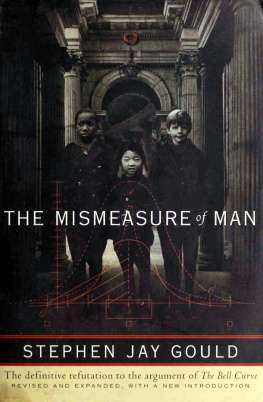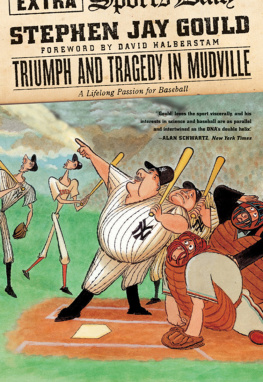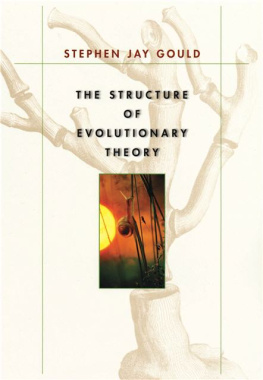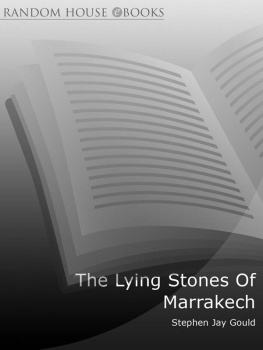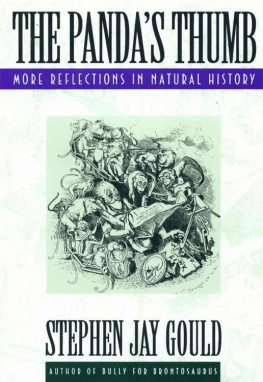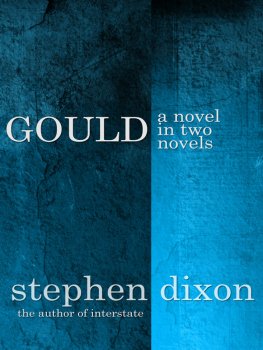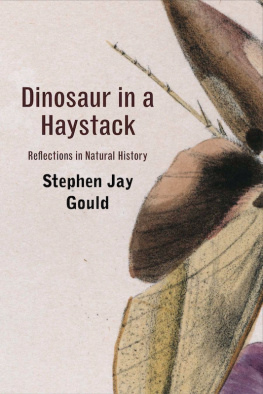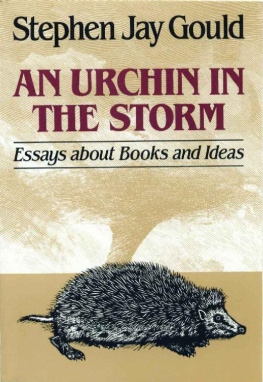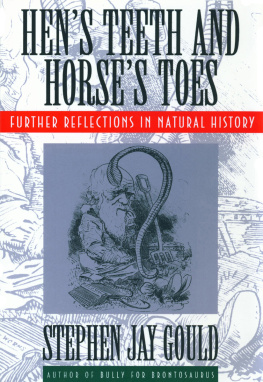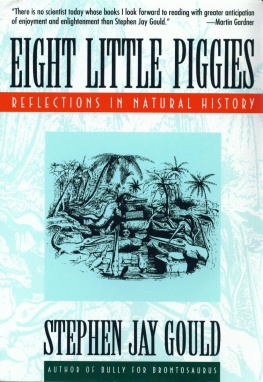Stephen Jay Gould - The Mismeasure of Man
Here you can read online Stephen Jay Gould - The Mismeasure of Man full text of the book (entire story) in english for free. Download pdf and epub, get meaning, cover and reviews about this ebook. year: 1995, publisher: W. W. Norton & Company, genre: Romance novel. Description of the work, (preface) as well as reviews are available. Best literature library LitArk.com created for fans of good reading and offers a wide selection of genres:
Romance novel
Science fiction
Adventure
Detective
Science
History
Home and family
Prose
Art
Politics
Computer
Non-fiction
Religion
Business
Children
Humor
Choose a favorite category and find really read worthwhile books. Enjoy immersion in the world of imagination, feel the emotions of the characters or learn something new for yourself, make an fascinating discovery.
- Book:The Mismeasure of Man
- Author:
- Publisher:W. W. Norton & Company
- Genre:
- Year:1995
- Rating:5 / 5
- Favourites:Add to favourites
- Your mark:
- 100
- 1
- 2
- 3
- 4
- 5
The Mismeasure of Man: summary, description and annotation
We offer to read an annotation, description, summary or preface (depends on what the author of the book "The Mismeasure of Man" wrote himself). If you haven't found the necessary information about the book — write in the comments, we will try to find it.
The Mismeasure of Man — read online for free the complete book (whole text) full work
Below is the text of the book, divided by pages. System saving the place of the last page read, allows you to conveniently read the book "The Mismeasure of Man" online for free, without having to search again every time where you left off. Put a bookmark, and you can go to the page where you finished reading at any time.
Font size:
Interval:
Bookmark:
BY STEPHEN JAY GOULD IN NORTON PAPERBACK
EVER SINCE DARWIN
Reflections in Natural History
THE PANDA'S THUMB
More Reflections in Natural History
THE MISMEASURE OF MAN
Revised and Expanded
HEN'S TEETH AND HORSE'S TOES
Further Reflections in Natural History
THE FLAMINGO'S SMILE
Reflections in Natural History
AN URCHIN IN THE STORM
Essays about Books and Ideas
ILLUMINATIONSA Bestiary (with R. W. Purcell)
WONDERFUL LIFE
The Burgess Shale and the Nature of History
BULLY FOR BRONTOSAURUS
Reflections in Natural History
FINDERS, KEEPERS
Treasures and Oddities of Natural History Collectors from Peter the Great to Louis Agassiz (with R. W. Purcell)
Copyright 1996, 1981 by Stephen Jay Gould. All rights reserved. For information about permission to reproduce selections from this book, write to Permissions, W. W. Norton & Company, Inc., 500 Fifth Avenue, New York, NY 101 10. Printed in the United States of America.
The text of this book is composed in Baskerville with the display set in Caslon 540. Composition and manufacturing by the Maple- Vail Book Manufacturing Group. Book design by Marjorie J. Flock.
Library of Congress Cataloging-in-Publication Data Gould, Stephen Jay. The mismeasure of man/by Stephen Jay Gould. Rev. and expanded.
p. cm.
Includes bibliographical references and index.
ISBN 0-393-03972-2. - ISBN 0-393-31425-1 (pbk.)
1. Intelligence tests History. 2. Ability Testing History. 3. Personality tests History. 4. Craniometry History. I. Title
BF431.G68
1996
153.9'3'09dc20
95-44442
W. W. Norton & Company, Inc., 500 Fifth Avenue, New York, N.Y. 10110 http://web.wwnorton.com
W. W. Norton & Company, Ltd, 10 Coptic Street, London WC1A 1PU
34567890
To the memory of Grammy and Papa Joe,
who came, struggled, and prospered,
Mr. Goddard notwithstanding.
GENES MAY BE SELFISH in a limited metaphorical sense, but there can be no gene for selfishness when I have so many friends and colleagues willing to offer their aid. I thank Ashley Montagu, not only for his specific suggestions, but also for leading the fight against scientific racism for so many years without becoming cynical about human possibilities. Several colleagues who have written, or are writing, their own books on biological determinism willingly shared their information and even let me use their own findings, sometimes before they could publish them themselves: G. Allen, A. Chase, S. Chorover, L. Kamin, R. Lewontin. Others heard of my efforts and, without solicitation, sent material and suggestions that enriched the book greatly: M. Leitenberg, S. Selden. L. Meszoly prepared the original illustrations in Chapter 6. Perhaps Kropotkin was right after all; I shall remain with the hopeful.
A note on references: In place of conventional footnotes, I have used the system of references universally found in scientific literaturename of author and year of publication, cited in parentneses after the relevant passage of text. (Items are then listed by author and by year for any one author in the bibliography.) I know that many readers may be disconcerted at first; the text will seem cluttered to many. Yet, I am confident that everyone will begin to read through the citations after a few pages of experience, and will then discover that they do not interrupt the flow of prose. To me, the advantages of this system far outweigh any aesthetic deficit no more flipping back and forth from text to end-notes (no publisher will set them all at the bottom of the page any more), only to find that a tantalizing little number yields no juicy tidbit of subsidiary information, but only a dry bibliographic citation; immediate access to the two essential bits of information for any historical inquirywho and when. I believe that this system of referencing is one of the few potential contributions that scientists, normally not a very literate lot, might supply to other fields of written scholarship.
A note on title: I hope that an apparently sexist title will be taken in the intended spirit not only as a play on Protagoras famous aphorism, but also as a commentary on the procedures of biological determinists discussed in the book. They did, indeed, study man (that, is, white European males), regarding this group as a standard and everybody else as something to be measured unfavorably against it. That they mismeasured man underscores the double fallacy.
The original title for The Mismeasure of Man would have honored my hero Charles Darwin for the wonderfully incisive statement that he made about biological determinism to climax his denunciation of slavery in the Voyage of the Beagle. 1 wanted to call this book Great Is Our Sinfrom Darwins line, cited as an epigraph on my title page: If the misery of our poor be caused not by the laws of nature, but by our institutions, great is our sin.
I did not follow my initial inclinationand I am sure that I made the right decisionbecause I knew damned well that my work would then be misshelved to oblivion in the religion section of many bookstores (as my volume of evolutionary essays, The Flamingos Smile, ended up in the ornithology division of a great Boston institution that shall remain nameless). Things can always be worse. I once, in an equally prestigious Boston emporium, found a copy of that 1960s undergraduate manifesto The Student as Nigger on a shelf marked Race Relations. My friend Harry Kemelman, author of the marvelous mystery series featuring theological sleuth David Small, told me that his first entry in the seriesFriday the Rabbionce appeared in a list of childrens titles as Freddy the Rabbit . But tables do turn occasionally. My buddy Alan Dershowitz told me that a woman successfully acquired his Chutzpah by telling the bookstore clerk: I want a copy of that book whose title I cant pronounce by the author whose name I cant remember.
I eventually decided on The Mismeasure of Man because the essence of my book, ina paradoxical way that conferred staying power over these fifteen years since initial publication, lies in its limitation of scope. The Mismeasure of Man is not fundamentally about the general moral turpitude of fallacious biological arguments in social settings (as my original and broader title from Darwin would have implhed). It1s not even about the full range of phony arguments for _ the genetic basis of human inequalities. The Mismeasure of Man treats one particular form of quantified claim about the ranking of human groups: the argument that intelligence can be meaningfully abstracted as a single number capable of ranking all people on a linear scale of intrinsic and unalterable mental worth. Fortunatelyand I made my decision on purposethis limited subjectembodies the deepest (and most common) philosophical error, with the most fundamental and far-ranging social impact, for the entire troubling subject of nature and nurture, or the genetic contribution to human social organization. +
If I have learned one thing as a monthly essayist for more than twenty years, I have come to understand the power of treating generalities by particulars. It is no use writing a book on the meaning of life (though we all long to know the answers to such great questions, while rightly suspecting that true solutions do not exist!). But an essay on the meaning of 0.400 hitting in baseball can reach a genuine conclusion with surprisingly extensive relevance to such broad topics as the nature of trends, the meaning of excellence, and even (believe it nor not) the constitution of natural reality. You have to sneak up on generalities, not assault them head-on. One of my favorite lines, from G. K. Chesterton, proclaims: Art is limitation; the essence of every picture is the frame.
Font size:
Interval:
Bookmark:
Similar books «The Mismeasure of Man»
Look at similar books to The Mismeasure of Man. We have selected literature similar in name and meaning in the hope of providing readers with more options to find new, interesting, not yet read works.
Discussion, reviews of the book The Mismeasure of Man and just readers' own opinions. Leave your comments, write what you think about the work, its meaning or the main characters. Specify what exactly you liked and what you didn't like, and why you think so.

